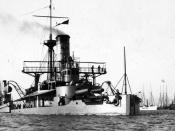Annie Mehigan
October 4th, 2014
Mrs. Lowe
Honors American Literature (A Block)
English Journal #3
In Nathaniel Hawthorne's The Scarlet Letter, Arthur Dimmesdale, a highly respected minister,
faces a lifeÂaltering decision: to confess that he is the father of Hester Prynn's infant child and be
damned to eternal Hell, or live a life of constant culpability. Had Dimmesdale been less of a coward, he
would have trudged his guilty feet up on to the scaffold on day one and asserted his role as the father,
regardless of the consequences that would have resulted. Having confessed, Dimmesdale would have a
chance at a life with the woman he loves the daughter they share. Having confessed, Dimmesdale would
not suffer the physical ailments that accompanied his guilty state. Having confessed, Dimmesdale would
not be living seven years of lies. Though Dimmesdale does eventually confess, the seven years he spent
living a secret life of sin contribute to his death; had he stood on the scaffold with his family seven years
prior, his demise may not have occurred. The selfÂharm, the loss of sanity, the eternal guilt that resulted
from Dimmesdale's cowardliness basically the seven years of hell that resulted none of this would
have taken place had Dimmesdale stepped forward. Had Dimmesdale mounted up the courage and
confessed that one pivotal day on the scaffold, he would not be standing there seven years later, facing
his death. Even Hester wouldn't be suffering alone. She wouldn't be this ostracized social outcast;
someone would be suffering with her. Even Pearl, one of the only Puritan children without a father
figure, would have answers as to where she came from. Chillingworth would not have had to drive
himself mad trying to discover if, in fact, Dimmesdale was the father. Had Dimmesdale confessed, his...


